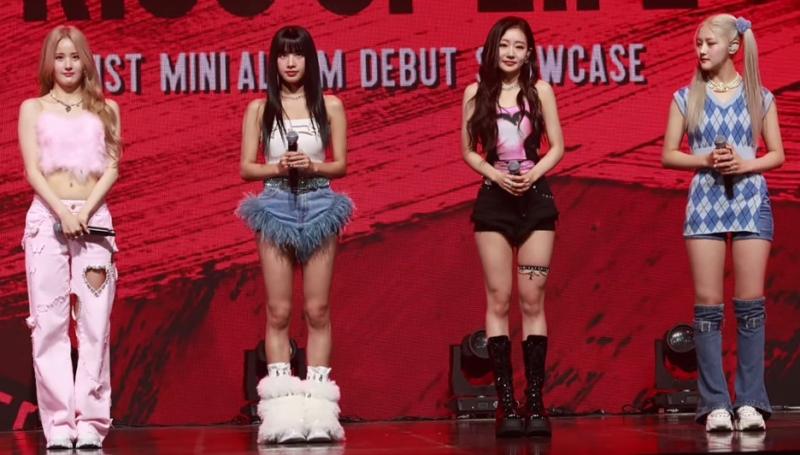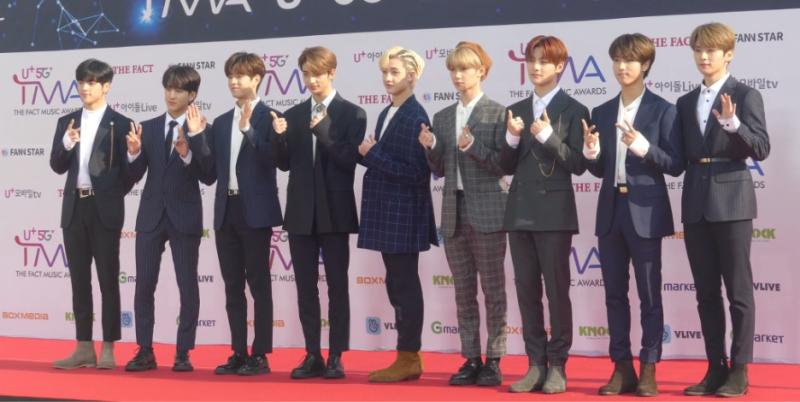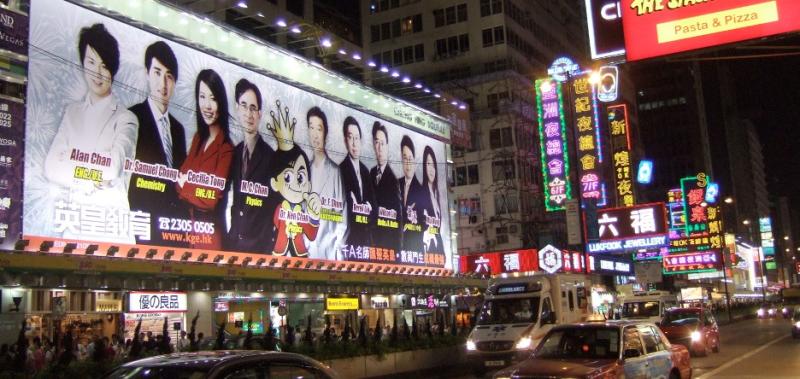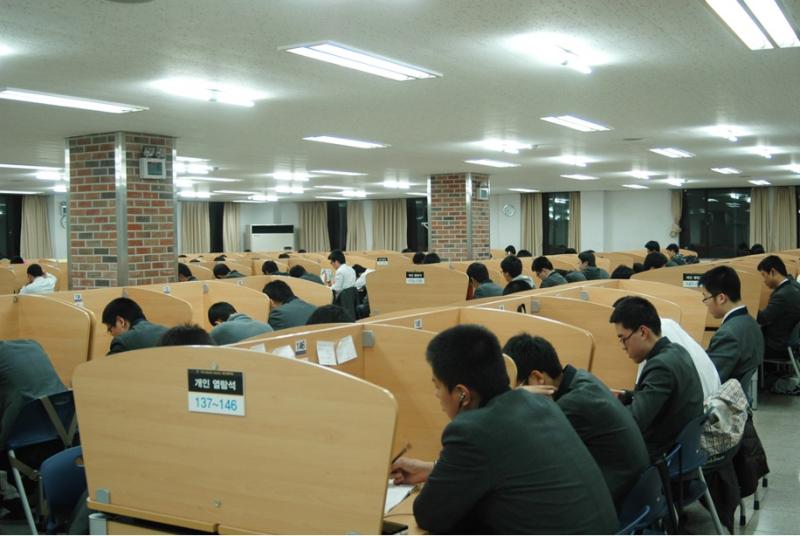
NewJeans in 2023. LTR: Hanni, Danielle, Minji, Hyein, and Haerin. Not only are two of the members Australian, but their songs make much use of English. By OLensglobal - YouTube – View/save archived versions on archive.org and archive.today, CC BY 3.0.
Languages of the Pop Pacific (part 2) – English
New Jeans, one of the breakout sensations of the K-pop industry, performed their viral hits “Super Shy”(2023) and “OMG”(2023) at the 2023 Billboard Music Awards. New Jeans shows that English has joined Korean as among the “official” languages of the K-pop cultural sphere, part of what I term the “Pop Pacific.” In fact, English is the native language of two of the four members, Hanni (of Vietnamese ancestry) and Danielle (of mixed Korean-Australian ancestry), who both can claim Australia as their native country.
And they used a lot of English in their “K-pop” songs. 86.7% of the words (347 of 402 words) in Super Shy were in English:
…along with nearly half of the words in OMG (313 of 642 words).
New Jeans won the best new top global K-pop artist award, beating out Stray Kids, TOMORROW X TOGETHER, TWICE and Jimin of BTS. Except for Jimin, all other nominees, like New Jeans, had English names. And even BTS is a romanized spelling of the English abbreviation of the group’s Korean name, Bangtan Sonyeondan (방탄소년단, Bulletproof Boy Scouts), although in 2017, BTS announced that their initials would conveniently switch to the English “Beyond the scene”.
So much English has entered into K-pop songs, and so many K-pop songs are translated and sung in Japanese by the original groups (the so-called “Japanese version” of songs), that the idea of K-pop standing for music sung in Korean no longer makes sense. In a previous post, I examined Korean, which signifies the K in K-pop. In this post, I will look at the use of English and Japanese in the K-pop world, and what it shows about Korea’s ambiguous relationship with the US and Japan.
Many of the non-Chorus lyrics of K-pop songs today are in English, not Korean. Sometimes K-pop groups release songs only in English, such as BTS’s “Dynamite” or “Butter,” and TWICE’s “The Feels.” So what does the K in K-pop mean? Professor David Tizzard writes that “We are thus left unsure what the K means. We know that it is popular. We know people love it. And we know people use it. The more it is loved, the more that it moves away from what it once was.”

Kiss of Life in July 2023. Most of the members are not Korean, and they sing in a mix of English and Korean. LTR: Belle (U.S), Natty (Thailand), Julie (U.S), and Haneul (Korea).
English is now quite common in K-pop songs, and could be considered one of the “official” languages of the “Pop Pacific,” a transnational cultural sphere. While Korean is the “prestige” language of K-pop, English binds the international audience together. This was especially noticeable as K-pop moved into the “second generation” in the 2000s and aimed at audiences outside of Korea. Just take a look at the lyrics and imagery from Kiss of Life, one of my favorite groups, in “Shhh” (2023). Of the four members, two are American and one is Thai.
Notice the hooks (the catchiest parts of the songs, like the chorus) of “shhh” like almost all songs in K-pop, are in English. Because English is learned by most youth in Asia, and used a lot by the educated middle classes, it has an aura of cool and sophistication. And, this is the part that most people worldwide can actually sing along to while humming along to the Korean lyrics.
This is a trend established by J-pop songs in the early 1990s, which scattered English phrases throughout songs or in titles, like TRF’s “EZ Do Dance”. The effect is to give even more of a western sound and feeling to J-pop songs. The use of English in J-pop wasn’t just copying English words, but rather mixing Japanese and English together And in K-pop and J-pop, the use of English words is a signal that the song is “hip” and “trendy”.
This is especially noticeable in K-pop. As pointed out by Jaime Shinhee Lee, Koreans also began using English in the 1990s to express sexually suggestive ideas that could sound offensive to censors if expressed in Korean. Songs that used Korean to express these ideas were banned, while songs that used English were allowed on the airwaves. Or, Korean writers playfully mixed English and Korean into a new hybrid language.
With the growth of the non-Korean market by the 2000s, given the need to market internationally, more of the English language flooded into K-pop songs, to the point where one can say that most K-pop songs today are a hybrid mix of at least half English lyrics.
Here’s a repost of a table of recent hits I made in a previous post on Korean in K-pop, but changed to show the prevalence of English in today’s K-pop songs. Consider these recent hits (again in an unscientific survey).
| Language of song title | Total words | English words | % English words | |
| Run BTS/darryeora bangtan (2022) by BTS | English and Korean | 613 | 337 | 55.0% |
| Fearless (2022) by Le Sserafim | English | 390 | 162 | 41.6% |
| Case 143 (2022) by Stray Kids | English | 563 | 327 | 58.1% |
| Love Dive (2022) by IVE | English | 363 | 253 | 69.7% |
| Super shy (2023) by New Jeans | English | 402 | 347 | 86.3% |

_
Stray Kids at The Fact Music Awards in April 2019.
The rise of English in K-pop shows the power of the United States in Korean history, and in Asia. The US took over trusteeship of the southern half of the Korean peninsula in 1945, with the Soviet Union running the North. The Korean War (1950-1953) solidified this division, with US military bases based in the South as part of a military alliance. The Japanese colonial masters were gone, but it seemed that the U.S had replaced them. Thus began an era of unprecedented US cultural dominance in Korea..
English as the language of Asia

"Star teachers" featured on a prominent billboard in Hong Kong for a cram school
The use of English in the Pop Pacific also shows how East Asian societies were anglicized through the education system. The ability to communicate in English has become a passport to a better job for the middle class. Thus, there is a craze to learn English among the middle class. Students throughout East and Southeast Asia are forced into a boring grammar-centered English education that often has little to do with actual use. Much of it is memorizing useless sentences that native speakers would never use.
From places like Vietnam to Indonesia, English is the marker of the Asian middle class. So there is a critical mass of Asian students who view English as a mandatory subject they must study, and perhaps a torture inflicted on them. But English is also a status symbol because it is a sign that one is from the right economic class. And English language learning also means that young K-pop fans throughout the world can understand simple sentences, especially if they are repeated in hooks and chanted throughout the song.
Due to the popularity of Western music, students often learn words through songs, and so the use of English in K-pop gives the songs a “western” sheen to go with the Korean one. In fact, in K-pop videos, signage and backgrounds are in English more often than in Korean. This leads to a vicious cycle – the more K-pop songs have English hooks, the more English has prestige and cool factor. Thus the two languages with prestige and cool are English and Korean, even if not understood by many listeners.
(To tell the truth, I can’t understand a lot of what even native English speakers are saying. I was listening to Justin Bieber’s Peaches, and thought he was saying a chant “o-ya-shi” or “dach-da-shi” or “ya-da-shi”. Only when I looked up the lyrics did I realize what he was actually saying).
But if you think that Korea’s relationship with English is complex, then its relationship with Japanese is infinitely more so, as we shall see in the next post.

Add new comment